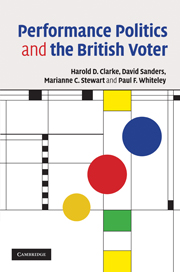Book contents
- Frontmatter
- Contents
- List of figures
- List of tables
- Acknowledgments
- 1 Performance politics and the British voter
- 2 The theory of valence politics
- 3 Valence politics and the long campaign
- 4 Tony's war
- 5 Electoral choices
- 6 The short campaign
- 7 Voting and political participation
- 8 Performance, people and the political system
- 9 Performance politics reconsidered
- Appendix A Vote in 2005 by socio-demographic characteristics
- Appendix B Turnout by socio-demographic characteristics
- Appendix C Dynamics of party identification
- Notes
- Bibliography
- Index
3 - Valence politics and the long campaign
Published online by Cambridge University Press: 06 January 2010
- Frontmatter
- Contents
- List of figures
- List of tables
- Acknowledgments
- 1 Performance politics and the British voter
- 2 The theory of valence politics
- 3 Valence politics and the long campaign
- 4 Tony's war
- 5 Electoral choices
- 6 The short campaign
- 7 Voting and political participation
- 8 Performance, people and the political system
- 9 Performance politics reconsidered
- Appendix A Vote in 2005 by socio-demographic characteristics
- Appendix B Turnout by socio-demographic characteristics
- Appendix C Dynamics of party identification
- Notes
- Bibliography
- Index
Summary
Modern election campaigns are lengthy affairs. In Britain, although official general–election campaigns typically last for approximately four weeks, the continuing long–term battle for the hearts and minds of voters resumes almost as soon as an election is over. Parties manoeuvre to ensure that the issues thought to favour them are salient on the issue agenda by devising media strategies aimed at securing the best possible coverage of their policy proposals and core values. They also work assiduously to project images of their leaders as capable, responsive and trustworthy. At the same time, events and developments—policy successes and failures, domestic scandals, international crises and other exogenous shocks—occur. Voters react by making judgments about parties, candidates and leaders on a continuing basis, that is, during the official ‘short’ campaigns in the month preceding a general election, as discussed in Chapter 6, as well as over the course of the inter–election cycle as a whole.
In this chapter, we show how important changes in the issue agenda after the 2001 general election affected voting in 2005. Two related events had a profound impact on public opinion during this period—the September 2001 terrorist attack on the World Trade Center and the March 2003 invasion of Iraq followed by the protracted, unresolved war in that country. These events changed the valence judgments of the British electorate in two important ways. First, they led to the development of a new set of issue priorities in the minds of voters, with traditional concerns about the economy and public services being overtaken by a ‘new’ agenda focused on internal and external security.
- Type
- Chapter
- Information
- Performance Politics and the British Voter , pp. 53 - 102Publisher: Cambridge University PressPrint publication year: 2009



